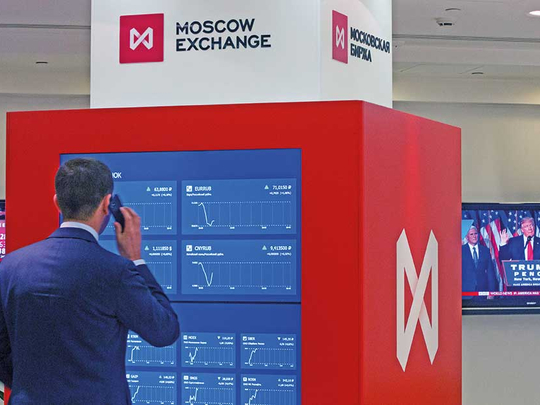
Dubai: As Trump Trades are losing their fizzle, fund managers are getting more constructive on emerging market equities.
The US markets have gained 11 per cent since the surprising win of Donald Trump in US elections spurred by hopes that higher spending would positively impact growth and therefore companies, in the world’s largest economy.
But now as the Trump Trades fizzles out, fund managers expect a reversal in the dollar index and see US yields falling from their peak, positively helping emerging market equities.
“We believe that the part reversal of the “Trump Trade” we have witnessed recently is good news from EM equities,” Mathieu Negre, Head of Global Emerging Equities at Union Bancaire Privée (UBP) told Gulf News over email.
This bullishness comes on the back of a fall in US yields to 2.2 per cent from the recent peak of 2.63 per cent, and a bout of weakness in the dollar index, which has fallen 4 per cent from the peak.
“The most worrying aspect of the “Trump Trade” for EM equities was expectations of a sharp rise in US yields and strengthening US dollar which would tighten monetary conditions in EM. In our view, both of these changes signal a continuation of the favourable monetary conditions for EM,” Negre said.
And after five years of underperformance in emerging markets, there is a huge scope for the current 32 per cent valuation discount between EM and global equities to shrink.
Plus, better economic activity in emerging markets would also be a positive for those markets.
“We have an overweight position in emerging market equities versus as we expect, an improvement in the macroeconomic outlook and corporate earnings,” Soledad Lopez, emerging market strategist at UBS Wealth Management said.
“A benign global backdrop with higher commodity prices, global growth and liquidity are likely to be supportive of equities. Earnings revisions ratios reached positive territory for the first time since February 2011,” Lopez said.
Valuations
In emerging equities space, fund managers from UBS, UBP, Columbia Threadneedle are upbeat on select markets.
For example, UBS prefers stocks in China, Indonesia, Thailand, Russia and Brazil.
“We are keeping Russia as a most preferred market despite recent volatility as we expect higher economic growth and stable to higher commodity prices to support earnings growth and the equity market,” Lopez said.
In terms of valuations, the cheapest region of the EM universe is EMEA (Europe, Middle East and Africa), according to UBP.
Russia and Turkey are particularly cheap at forward Price to Earnings (PE) multiples of 6 and 9 times respectively versus the EM median of 12.4 times.
“At 16 times earnings, South Africa does not look particularly cheap but this market has always traded at a significant premium to EM due to the high quality of its corporate sector,” Negre said.
This historic premium has recently come down after President Zuma’s ousting of his finance minister, and “equities do not look expensive relative to their history, Negre said. Bloomberg consensus earnings growth expectations for EM is around 16 per cent for 2017, pointing to expectations in terms of returns.
Alpha returns
For Columbia Threadneedle there are interesting trends at play in these emerging markets.
For example in India, Indonesia and Eastern Europe, the focus should be on acceleration in consumption trends, Investors should look at Indonesia, Philippines, Brazil and India for structural progress.
Krishan Selva, client portfolio manager has a simple message for creating those extra returns or an alpha, as they are popularly known.
“We believe using an investment approach that combines top-down analysis with bottom-up research will enable the fund to generate alpha over the long term and provide a compelling argument to invest in an active EM approach,” Selva said.







